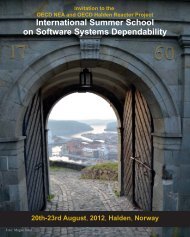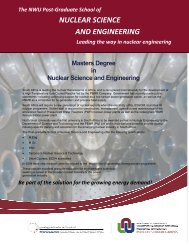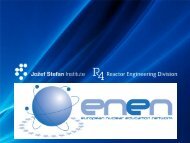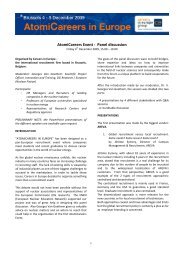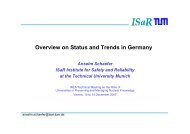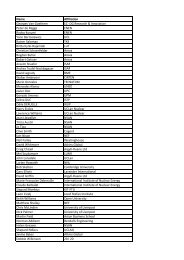Annex I Description of Work (April 2007) - ENEN Association
Annex I Description of Work (April 2007) - ENEN Association
Annex I Description of Work (April 2007) - ENEN Association
- No tags were found...
You also want an ePaper? Increase the reach of your titles
YUMPU automatically turns print PDFs into web optimized ePapers that Google loves.
Euratom 2005-6 – Fixed deadline<br />
Coordination Actions<br />
<strong>ENEN</strong>-II<br />
- Identification and development <strong>of</strong> solutions to specific problems and deficiencies which hinder<br />
the attainment <strong>of</strong> the aims <strong>of</strong> the Network;<br />
- Facilitating the exchange <strong>of</strong> information between the Members <strong>of</strong> the <strong>ENEN</strong> <strong>Association</strong> - on<br />
course objectives, content, modes <strong>of</strong> presentation and other matters.<br />
There are two types <strong>of</strong> Members in the <strong>ENEN</strong> <strong>Association</strong>, the Effective Members and the<br />
Associated Members. Effective and Associated Members are institutions or corporate bodies.<br />
The Effective Members are academic institutions or clusters <strong>of</strong> such institutions having a legal status<br />
and meeting all following criteria:<br />
- Provide high-level scientific education in the nuclear field -as full time teaching and providing the<br />
basis for doctorate studies- based on internationally recognized research in nuclear engineering<br />
and/or nuclear sciences, which is carried out jointly by the teaching staff, the students, and the<br />
doctoral and post-doctoral researchers in the same geographic location or in association with a<br />
nuclear research centre.<br />
- Use selective admission criteria conforming to legal provisions and/or national practices.<br />
- Be based in the European Union or in one <strong>of</strong> its candidate member countries.<br />
The Associated Members are corporate bodies having a legal status, such as nuclear education and<br />
research organisations, government institutions, nuclear companies, regulatory bodies, nuclear<br />
learning societies, who conform to the following criteria:<br />
- commit themselves to support the <strong>ENEN</strong> <strong>Association</strong>;<br />
- have a firmly established tradition <strong>of</strong> relations with some <strong>of</strong> the members in the fields <strong>of</strong><br />
education, research and training;<br />
- are based in the European Union or in one <strong>of</strong> its candidate member countries.<br />
The legal entity “European Nuclear Education Network <strong>Association</strong>” with a current membership <strong>of</strong><br />
34 universities, one university consortium grouping six universities and six research centres located<br />
in 18 European countries constitutes the consortium <strong>of</strong> the <strong>ENEN</strong>-II project. The Board <strong>of</strong><br />
Governors <strong>of</strong> the <strong>ENEN</strong> <strong>Association</strong> will act as the coordinator <strong>of</strong> the <strong>ENEN</strong>-II project, mainly<br />
through the Office <strong>of</strong> the Secretary General for the everyday follow-up and management <strong>of</strong> the<br />
project.<br />
1-2 Katholieke Universiteit Leuven (KUL)<br />
K.U.Leuven Research and Development is a branch <strong>of</strong> the "Katholieke Universiteit Leuven"<br />
(K.U.Leuven; University <strong>of</strong> Leuven), Leuven, Belgium, that promotes and manages the research<br />
contracts <strong>of</strong> the university research groups with third parties. The K.U.Leuven is the oldest and<br />
largest university in Belgium (founded in 1425). The centre that will perform the work proposed in<br />
this proposal is the K.U.Leuven Center for Nuclear Engineering. This interdepartmental centre <strong>of</strong>fers<br />
the Nuclear Engineering programme at the university (organised at the post-graduate level). Next to<br />
its teaching activities, its members perform research work in subjects such as nuclear materials,<br />
nuclear thermal hydraulics, nuclear safety, nuclear waste management and nuclear fusion. Over the<br />
last six years, the Centre has successfully collaborated with the university <strong>of</strong> Ghent (Belgium) in<br />
<strong>of</strong>fering a common nuclear engineering program, and is presently heavily involved in the discussion<br />
to construct one single Belgian programme. It is in this context that the Centre is interested to<br />
broaden the scope even further in trying to participate in a European exchange network.<br />
William D'haeseleer is a Full Pr<strong>of</strong>essor at the University <strong>of</strong> Leuven (K.U.Leuven). He presently<br />
teaches courses in the domains <strong>of</strong> Nuclear Engineering (Nuclear Reactor Physics, Nuclear Reactor<br />
<strong>Annex</strong> I <strong>Description</strong> <strong>of</strong> <strong>Work</strong> - page 84 <strong>of</strong> 124



